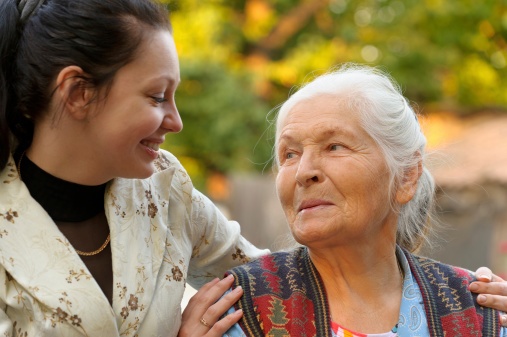By Kate Ranta on Nov 25, 2014 @ 09:00 AM
Caring for the elderly is tough work—that’s an understatement. One important factor in their care that may fall by the wayside sometimes is dental care. However, poor dental hygiene can contribute to conditions such as Alzheimer’s disease, stroke, heart disease and increased rate of pneumonia, as well as malnutrition and impaired speech. These detract from their quality of life—not to mention life threatening consequences.
Yet, oral diseases are more common in the elderly. As we age, our teeth are at greater risk for decay. That’s because many medications the elderly take reduce the normal flow of saliva. Saliva helps offset decay and cleans gums; it also contains enzymes that kill bacteria. Poor oral hygiene, combined with inadequate saliva, can speed up tooth decay.
You can help make sure your loved one’s teeth and gums stay as healthy as possible. Here are some tips for dental care for the elderly:
- Brushing. If your loved one is able to brush his/her own teeth, you should supervise and ensure it’s happening twice a day. Be sure the toothbrush’s handle is straight and easy to grip, and has soft bristles.
If you need to brush for your loved one, use a pea sized amount of fluoride toothpaste and gently brush the teeth and gums. Don’t forget the tongue, and areas where any teeth are missing. If oral hygiene hasn’t been cared for in the past, you may notice some bleeding of the gums. That should improve after the first few brushings. - Flossing. This might be a tough one to get your loved one to do, especially if he/she hasn’t been in the habit for a long time. However, you should encourage it. Dental floss is the only effective way to clean between the teeth—a very important preventive method.
- Check for dry mouth and oral cancer. Signs of dry mouth include difficulty swallowing, a change in eating habits, red around the mouth, or lips that are dry or stick together. It’s an uncomfortable condition that is also bad for the teeth. Many products can relieve symptoms, but it’s very important to make sure your loved one is drinking enough water. Offer water before, during and after meals, as well as throughout the day.
And, once a month, check for oral cancer. It’s at its highest rate between ages 65-75—and very easy to miss if the person cannot check his/her own mouth. You’ll want to look for red or white lesions, lumps or ulcers that last longer than 7-10 days. - Don’t forget denture care. Clean dentures—and tissues of the mouth—are important, as well. Food, plaque and other substances collect on dentures, just as they do on natural teeth. The tongue, gums, insides of cheeks and roof of the mouth should be cleaned at least twice a day. And, you should take dentures out at least once a day and brush and clean them well.
Elderly care includes ensuring good oral health. Do your best to make sure your loved one’s dental care is as thorough and routine as possible.





comments